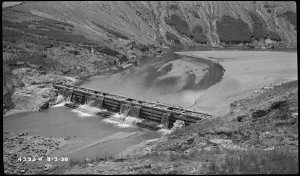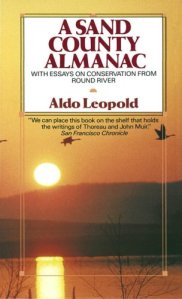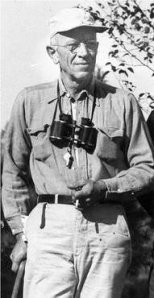A Sand County Almanac came at the end of Aldo Leopold’s career in professional wildlife management and conservation. Much of his career was spent in the United States Forest Service. He was thus an agent of state-directed conservation and “management.” As his life spanned from the Progressive era to the height of the New Deal project, it is not surprising that he looked to the state for answers. As my last post tried to map out in broad terms, over the course of the 1930s, Leopold lost faith in “civilization” and the state as agents of conservation. By the end of the 1930s, he was looking to the “farmer as conservationist” instead. If A Sand County Almanac was Leopold’s last words, it is striking that the state is almost absent. Surely it has a place in the background and he probably never thought that it had no role in rectifying the relationship between humans and the land, but Leopold was largely thinking in terms of an ethical transformation led by various vernacular forces. I even can see Leopold moving toward an idea that there is an utter disconnect between all aspects of “civilization” and the land.
In 1941, in a then-unpublished manuscript “Yet Come June,” Leopold wrote: “Empires spread over the continents, destroying the soils, the floras and faunas, and each other. Yet the trees grow. Philosophies spread over the empires, teaching the good life with tank and bomb. Machines crawl over the empires hauling goods. Goods are plowed under, or burned. Goods are hawked over the ether, and along lanes where Whitman smelled locusts blossoms morning and evening. Quarrels over godos are planted think as trees along all the rivers of America. . . . Trucks carrying goods race the railroads. Cars carrying consumers of goods race the trucks. Yet the trees grow. . . . Chemists and physicists harness power, biology harnesses plants and animals, all for goods. Politics is the redistribution of goods. Literature and the arts portray the drama of the haves and have-nots. Research is not to decipher the universe, but the step up production. Yet the trees grow.” (457)
Leopold tackled education in a 1942 conference talk called “The Role of Wildlife in a Liberal Education,” which worried that the place of the land in education rested on economic utility: career preparation or policy formulation. As a result wildlife education was largely rooted in the uses of the science. Of course, by this point, Leopold was done with such concerns. Instead he view that wildlife education should aim “to teach citizens the function of wildlife in the land organism.” (466) He even foreshadows the growing influence of ecology in other disciplines. Of course now, scholars in fields as far afield from biology as history and philosophy have discovered that their work is enriched by incorporating the ecological. Leopold juxtaposes wildlife education (what we may now call ecology) with “conservation education,” which is concerned with the preservation of one small part of nature for human use, often at the expense of others. “The basic fallacy in this kind of ‘conservation’ is that it seeks to conserve one resource by destroying another. These ‘conservationists’ are unable to see the land as a whole.” (528) In other words, these conservationists are unable to “think like a mountain.”
Leopold’s turn away from the state as an agent of conservation can be seen in another essay, “Land-Use and Democracy,” published in 1942. At this point he is able to look back at the entire New Deal project and its role in conservation. What he sees are the accoutrements of conservation with little meaningful movement toward a revision of our relationship with the land. “Just so we deal with bureaus, policies, laws, and programs, which are the symbols of our problem, instead of with resources, products, and land-ises, which are the problem. Thus we assuage our ego without exposing ourselves to contact with reality.” (476) This should certainly be familiar to us. As we are driving off the cliff of climate change and extinction it would be hard to find a government that does not claim to be moving toward responsible resource use (or sustainability or whatever euphemism is popular now). And what of the concerned public. Most, Leopold points out, are content voting for politicians who promise to back conservation or sending money to groups engaged in good work. That is, laying responsibility on “bigger and better laps.” (477) Democracy seems ill-suited to change the use of the land. As individuals our ecological decisions are often horrifying (putting a dead tree with many years of life ahead of it in our homes for the holidays or eating wheat produced through the destruction of the prairie), even if our sentiments are with the land. If the public cannot be trusted, it is up for government (technocracy) to mitigate our worst tendencies. Yet, government makes a hash of it. Either government simply has no power over what is most necessary to pay attention to (such as the day to day use of land involved in agriculture) or taking well-meaning and even beneficial actions that simply do not help much (artificial reforestation, regulating game fish populations, or rodent control.
For Leopold, the conclusion is that meaningful conservation must come from the bottom up: “collective self-renewal and collective self-maintenance.” (482) For this to happen, perhaps we need to accept that moral or cultural change is a prerequisite.
While most people will likely only read A Sand County Almanac as a record of Aldo Leopold’s vision, I think there is an important lesson that comes from looking at the evolution of his thought from the beginning of his career until the publication of that monumental text. In Leopold we have a state conservation worker who learned that the state looks at wildlife with one set of eyes (to use James Scott’s phrase, conservationists tended to “see like a state”). These days we still tend to look to governments (or now transnational governing institutions) to act to fight climate change. This is precisely what Leopold was warning against when he argued that conservation must come from the bottom up.










